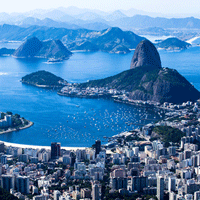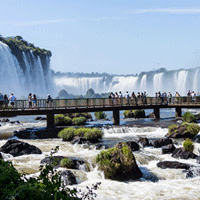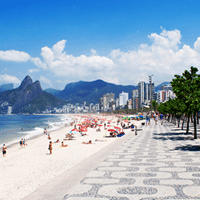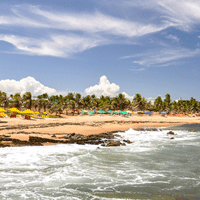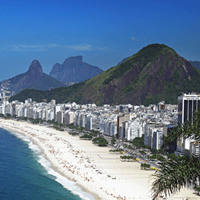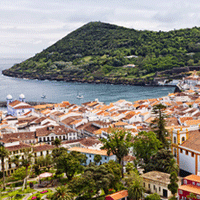Brazil
Coastal BeachesBrazil, officially the Federative Republic of Brazil, is the largest country in both South America and Latin America. It is the world's fifth-largest country by area and the sixth most populous. Its capital is Brasília, and its most populous city is São Paulo. The federation is composed of the union of the 26 states and the Federal District. It is bounded by the Atlantic Ocean on the east, and it has a coastline of over 7,491 kilometers. Brazil's landscape is very diverse, featuring a wide range of ecosystems, such as the Amazon Rainforest, recognized as having the greatest biological diversity in the world, the Atlantic Forest, and the Cerrado, which is the savanna-like region in the central part of the country. The Brazilian economy is the world's twelfth largest by nominal GDP and eighth largest by purchasing power parity. The country has a mixed economy with abundant natural resources. Brazil is a regional power in Latin America and an emerging power on the international stage, with potential for growth in influence. It is a founding member of the United Nations, the G20, BRICS, Mercosul, Organization of American States, Organization of Ibero-American States, and the Community of Portuguese language Countries. Brazil's culture is a thriving fusion of Portuguese, African, and indigenous influences, along with those of immigrants from Europe, the Middle East, and Asia. Carnival, samba, bossa nova, and capoeira are widely recognized symbols of the nation's vibrant cultural mosaic. Football (soccer) is deeply ingrained in Brazilian culture, and the country has a storied history in the sport, having won the FIFA World Cup a record five times. Brazil's democratic government has faced challenges, including economic disparities and political corruption, but it continues to work towards a more equitable and prosperous society for its people.
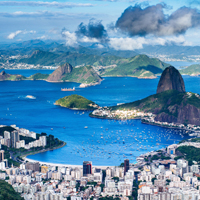 Oliveira Lawyers
Oliveira LawyersGet Quote
Oliveira Lawyers is the foremost Brazilian law firm dedicated to representing the interests of foreign citizens in Brazil. From immigration to real estate and other life events, our bilingual attorneys got you covered! Main services include immigration, real estate, notary services, tax services, collections, family law, and litigation.
 Oliveira Lawyers
Oliveira LawyersOliveira Lawyers is the foremost Brazilian law firm dedicated to representing the interests of foreign citizens in Brazil. From immigration to real estate and other life events, our bilingual attorneys got you covered! Main services include immigration, real estate, notary services, tax services, collections, family law, and litigation.
Get Quote
Living in Brazil
Best Places to Live in Brazil
Visa & Residency
Obtaining a residency in Brazil involves several steps and can vary in complexity depending on the type of visa applied for. The two most common types of visas for expats are the Permanent Visa (VIPER) and the Temporary Visa (VITEM). The Permanent Visa is typically for those who have family ties in Brazil, such as a Brazilian spouse or child, or for those who are retiring in Brazil with a transfer of a sufficient monthly income. The Temporary Visa encompasses various categories, including work, study, and research. For a work visa, the applicant must first secure a job with a Brazilian company, which will sponsor the visa. The company must prove that the position cannot be filled by a local worker. The Temporary Visa for work is usually valid for up to two years and can be converted into a permanent visa after this period. Digital nomads often use the Temporary Visa (VITEM-V), which is intended for artistic or cultural activities, including sports, but can be adapted for remote workers. This visa allows them to live in Brazil for up to one year and can be extended for another year. The application process generally involves submitting various documents, such as a passport, birth certificate, proof of income or employment, and a criminal background check. Applicants must also fill out the appropriate application forms and pay the required fees. Some visas require registration with the Federal Police in Brazil within 90 days of arrival. The difficulty of the process can vary. It is considered average, but it can be challenging due to bureaucratic hurdles and the need for proper documentation and sponsorship. It is highly recommended to consult with the Brazilian consulate or embassy in the applicant's home country, as well as potentially hiring a legal representative or specialist to assist with the process. The exact requirements and procedures can change, so up-to-date information should be sought during the application process.
Healthcare in Brazil
The healthcare system in Brazil is a complex mix of public and private services. The public system, known as the Unified Health System (Sistema Único de Saúde, SUS), provides healthcare services to the entire population free of charge. It is funded by taxes and is the largest system of this type in the world. However, due to underfunding and mismanagement, the quality of public healthcare can vary greatly, with long waiting times and sometimes substandard conditions in overcrowded hospitals. In contrast, the private healthcare sector offers high-quality services with more modern facilities and shorter waiting times, but at a cost that can be prohibitive for many Brazilians. Expats and digital nomads can access public healthcare by registering with the SUS and obtaining a Brazilian taxpayer registry number (CPF). However, many expats choose to use private healthcare due to its higher quality and efficiency.
Cost of Living
The cost of living in Brazil can vary greatly depending on the region and city, with urban areas typically being more expensive than rural ones. Overall, the cost of living is considered moderate when compared to other countries.
Weather
Brazil has a predominantly tropical climate with variations due to its large size. The Amazon region in the north experiences hot, humid, and wet conditions, while the central part of Brazil has a more seasonal climate with a mix of dry and wet seasons. The south of Brazil enjoys a subtropical climate with cooler temperatures and distinct seasons.
Educational System in Brazil
The educational system in Brazil is structured in several levels, starting with preschool education (Educação Infantil) for children up to 5 years old. Following this, students enter fundamental education (Ensino Fundamental), which is mandatory and divided into two stages: the first stage covers grades 1 to 5 (ages 6 to 10), and the second stage covers grades 6 to 9 (ages 11 to 14). After completing Ensino Fundamental, students progress to secondary education (Ensino Médio), which lasts for three years, typically from ages 15 to 17. This stage prepares students for higher education and culminates in a national high school exam (ENEM), which is used for university admissions. The Brazilian educational system has faced challenges, including disparities in quality and access, but there are also prestigious schools, particularly in urban areas. Public education is free at all levels, and the country has been working to improve educational standards and increase school attendance. For families moving to Brazil, it's important to note that while public schools do not charge tuition, many opt for private schools seeking better quality education. The academic year usually starts in February or March and ends in November or December, with a break in July.
Universities in Brazil
The university system in Brazil comprises both public and private institutions, with public universities generally considered to be of higher quality and more competitive. Admission to public universities is mainly through the ENEM exam, and these institutions do not charge tuition fees. University education typically lasts four to six years, depending on the field of study, with courses such as Engineering, Law, and Medicine often taking longer. Brazilian universities offer undergraduate (Bacharelado), postgraduate (Lato Sensu and Stricto Sensu), master's, and doctoral programs. The academic year is divided into two semesters, and the language of instruction is predominantly Portuguese, although some programs may offer courses in English. For foreign students, it is essential to demonstrate proficiency in Portuguese and, in some cases, to take the Vestibular exam or the ENEM. Living costs in Brazil can vary significantly, but scholarships and financial aid opportunities are available for international students. Additionally, private universities charge tuition fees, which can be a significant expense.
Copyright 1997-2025 Burlingame Interactive, Inc.

